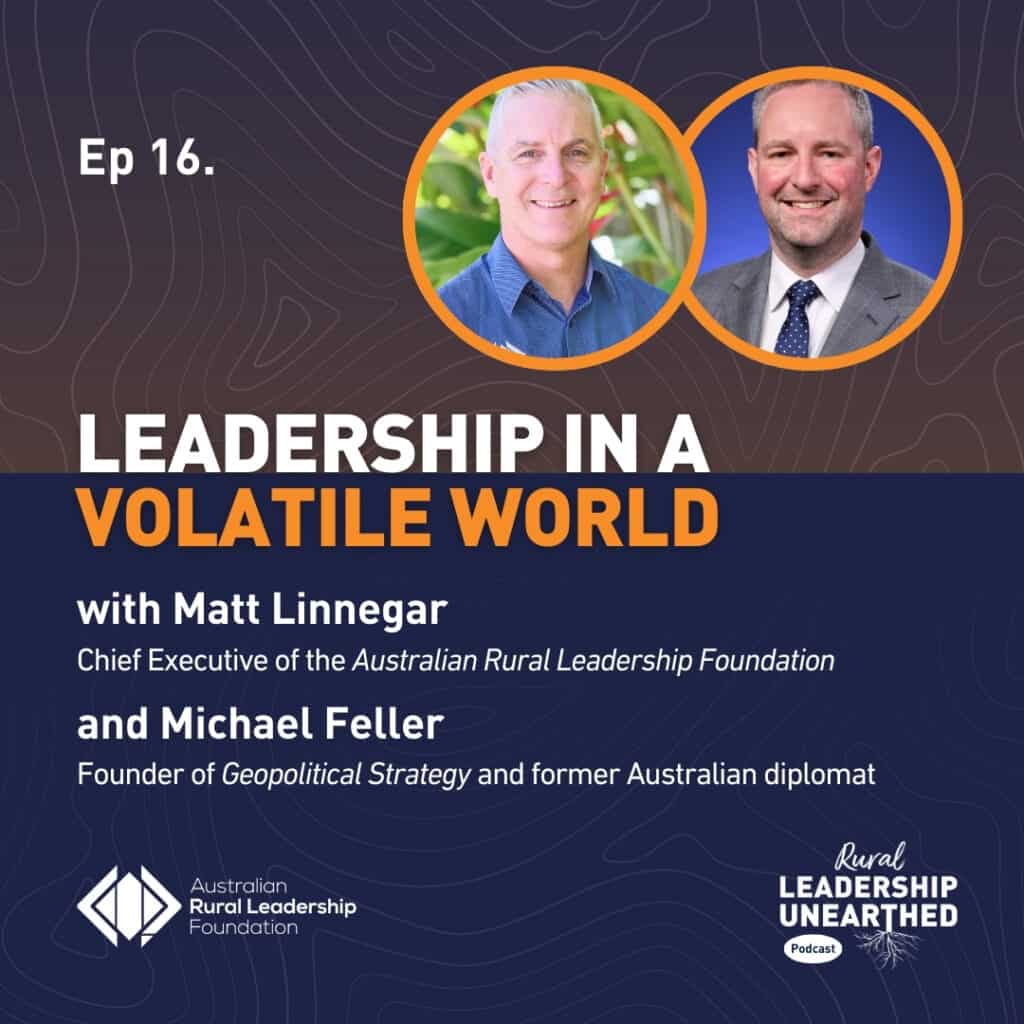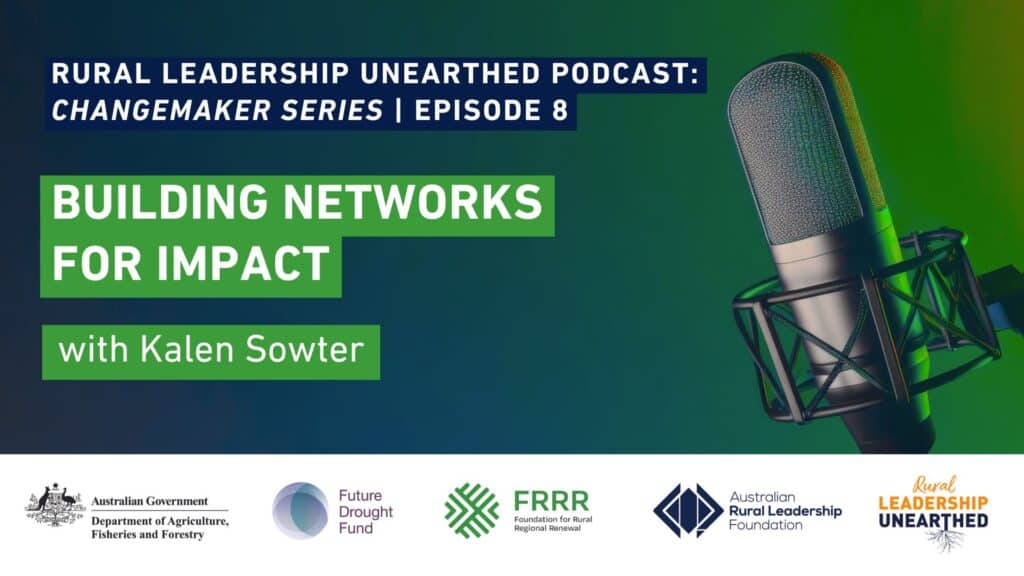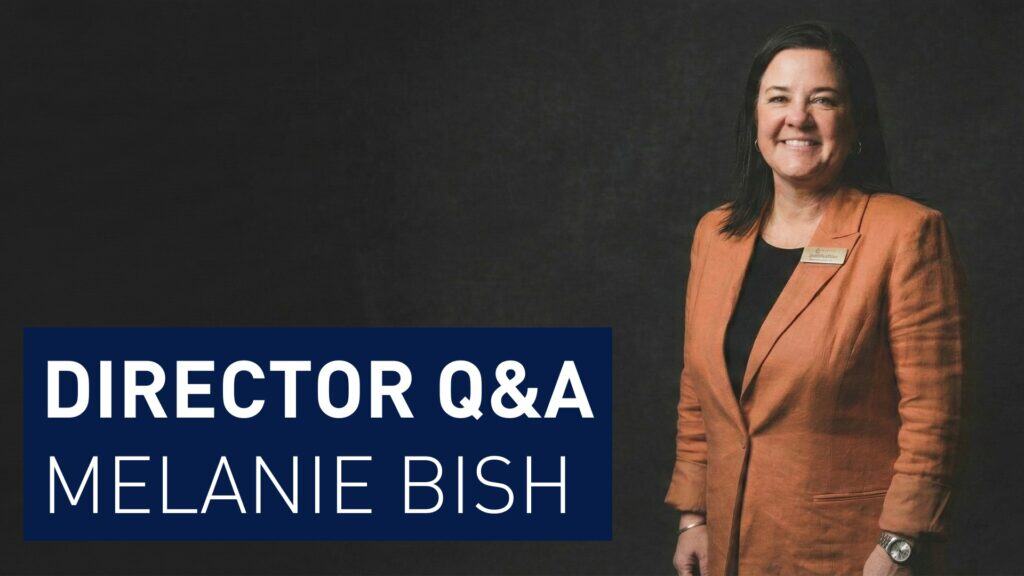In the latest episode of the ARLF podcast, Rural Leadership Unearthed, our CEO, Matt Linnegar, sits down with former Australian diplomat and founder of Geopolitical Strategy, Michael Feller, for a conversation about leadership in an increasingly chaotic global environment.
Some of our ARLP alum will know Michael from the international relations low-down he provides ahead of the overseas component of the program, but in this chat, he and Matt zoom-out and look at what’s currently impacting heads of state and how they are responding.
While looking at the limitations to a leadership approach that is purely ‘transactional’, Matt and Michael also discuss the implications of economic policies impacting free trade and offer some observations about what may lie ahead for Australia and our region as we experience the shift from a unipolar global order towards a multipolar order.
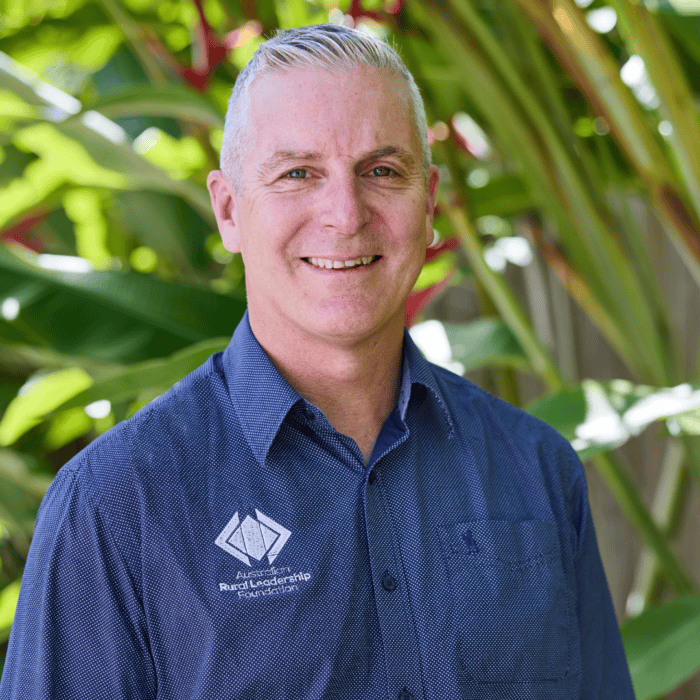
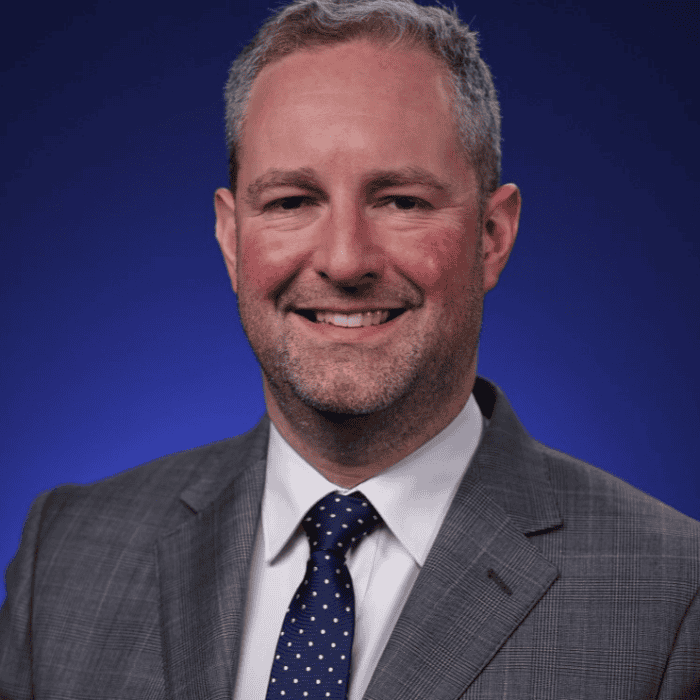
Matt Linnegar: Michael, we’d love to hear a little bit more about you and what Geopolitical Strategy is all about.
Michael Feller: I’m a geopolitical strategist, a former diplomat and former policy advisor at the Department of Prime Minister and Cabinet and in the Office of Australia’s Trade Minister. I started Geopolitical Strategy to essentially bring the type of advice that my colleagues and I were giving senior leaders in government to leaders in business and the wider community. We have clients around the world and we’re helping them navigate these very stormy waters that we all find ourselves in today.
ML: We know the broader geopolitical landscape is and potentially will have further impact right here at home. Do you want to paint us a bit of a picture to start with about what you think that looks like, where some of the flashpoints might be?
MF: Unsurprisingly, I’ll start in the White House because people are really waking up to the risk of a US recession due to these policies on trade, on budgetary cuts and on economic policy. We’re also seeing extraordinary change in US foreign policy ranging from Ukraine to Gaza, right here to potentially Australia. We’re facing potential tariffs on a range of exports, nothing yet on agricultural exports, due to our free trade agreement with the United States, but certainly aluminium and steel. We’re also seeing sabre-rattling continue in the Taiwan Strait from China. We’re seeing wars in Africa. We’re seeing uncertainty not only in Israel continue, but now in Syria as well. Beyond that, there are a whole host of events throughout Latin America and Central Asia that we’re observing that are falling under the radar really just because there’s so much noise and movement coming out of Washington, DC.
ML: You’d have to describe it as an unstable or a destabilised environment, and we know there are lots of moving parts contributing to that. But the biggest moving part has to be what’s happening in the States. It’s interesting, isn’t it, to look at that and say, on the one hand, one thing you might admire in leadership is some decisiveness. I don’t think that’s been the issue here. There’s been a lot of decisiveness. What might the US gain from for the country from a leadership perspective by making this sudden U-turn and taking a very different approach on the world stage?
MF: It comes down to a clash of leadership cultures and contexts. You have the Trump administration essentially coming in with a mandate of insurgency and disruption. It’s populated with advisors like Elon Musk, whose leadership style might be appropriate and work very well in the startup or the technology space.
There’s that expression, ‘move fast and break things’. There’s a very energetic approach. But you know, the stakes in those businesses are lower and the upside of such disruptive behaviour is higher and the risks are lower. The problem with transplanting that style of leadership to the United States government is the US government isn’t a startup. It’s not a technology company. It’s not even a normal country. It’s the leader of the free world. And to come and disrupt that, you can’t help but throw the baby out with the bathwater and hurt a lot of people in return. So essentially, that’s the problem with this new administration in Washington. They were elected to change things, but I don’t think even the most ardent supporters expected them to be changing things in such a chaotic fashion… They’re in danger of not just crashing the economy but they’re in danger of completely undoing 80 years of rules-based order-making around the world that since World War II the United States has essentially fashioned the world in its image and now have the United States tearing that up … You know, people use the word ‘unprecedented’ a little bit too often, I think, but it’s hard to find another word for what’s happening here, at least in living memory. I’m sure we could go back further in history to find other analogies of situations like this occurring, but certainly in living memory.
ML: It clearly appears to be a very transactional approach to making progress here where if you’re ‘winning’ the transaction then there’s something to gain, even in the short term. What are the downsides of a transactional approach to leadership in your view, particularly on the global stage?
MF: I spoke about how Trump’s transplanted a lot of Silicon Valley people. He himself has a leadership style that I think quite clearly has come from the world of New York real estate development. You can afford to be transactional. But he could afford to do that because New York’s a big town and at the end of the day people just wanted to do a real estate deal. The problem with the world is that even though it’s a bigger place the players are fewer.
The United States is so central to the system that you can’t just keep damaging relationships. A transactional leadership style doesn’t work in that context. You need a relationship, consensus-building leadership style. And that’s why US presidents in the past have behaved as they have… What’s frustrating to me as a geopolitical analyst looking at this is that you have an administration filled with very clever people, but they seemingly can’t see the wood for the trees here. They can’t seem to see that their actions, which may make sense in a very narrow domestic political context, not only have economic ramifications, but they’re going to have geopolitical ramifications that will be very difficult to unpick. And already we’re seeing in Europe, for instance, 80 years of continuity evaporate in a matter of weeks.
ML: One of the most difficult things in leadership, wherever it’s practiced, is to maintain that focus and to act on behalf of a good greater than yourself or greater than what’s immediately surrounding you. And you could say that it’s becoming even more difficult both in Australia and around the world to continue to adopt that sort of approach, because the easier thing to do is to give in to fragmentation to represent smaller and smaller interests or those closer to home and so now we’re seeing this played out again on the global stage where the rules-based order bringing people together for the interest of common or greater good seems to becoming all the more difficult. Is that what you’re seeing and what might be some of the implications of that?
MF: It’s certainly something that I’m seeing. There are some silver linings though in that Europe seems to be banding together more than they had been under the previous administration or indeed for decades. There’s this saying that Europe is always forged in crisis and certainly the crisis has arrived on the military front and we’re seeing some very welcome signs of leadership from Germany, France and even the UK, although it’s technically no longer a member of the European Union, it’s behaving for the first time really since 2016 as if it is an integral part of the wider European community.
There were also some subtle signs that those powers are beginning to reach out beyond. Australia was invited by Sir Keir Starmer in the United Kingdom to join the coalition of the willing on Ukraine where we would hypothetically send peacekeepers there if that was what was agreed between the parties. We’re also seeing outreach to Australia from Japan, which is a fairly like-minded partner. And I wouldn’t be surprised if under Canada’s new government, we see some outreach from them. So perhaps the irony in what’s happening with Trump is that we could be seeing a revival of these moribund institutions, perhaps not the United Nations, but perhaps the European Union, perhaps even the Commonwealth, might gain greater salience here.
However, the decline of leadership standards, if you want to call it that, it’s not just unique to the United States. Unfortunately, we’re seeing signs of backsliding in Indonesia’s democracy, Thailand certainly is the case. And then there’s other countries which can hardly be called democratic at all. they’re sort of doubling down on their autocratic tendencies. Vietnam comes to mind. Trump is not exactly an outlier here, unfortunately. We’re seeing this sort of transactional trend happening all around the world.
It’s our job in Australia, think, to push back against that and to make sure that our politics is one of building the greater good, not just for our own society, but for the region, because that’s ultimately going to be more sustainable in the long term and make us stronger and more prosperous in the long term.
ML: You mentioned some of the countries that are reaching out to either their neighbours or those maybe sharing similar worldviews about the importance of democracy in a world where autocracy is on the rise perhaps. What if you reflect on some of that from Canada to the UK to Mexico and other countries, what are some of the leadership and types of leadership behaviours that you’re seeing to promote that sort of approach?
MF: If you look at the most popular leaders around the world at the moment, or the leaders who are seeing their popularity grow, it’s not the leaders who are behaving like Trump. It’s the leaders who are being calm in the face of this, that are being committed to values. So we’ve seen Claudia Scheinbaum in Mexico, her approval rating has hit 85%. Justin Trudeau, before he retired as Prime Minister, his popularity had rebounded almost to where it was before. People were wondering when he would leave. Keir Starmer, he’s seen his popularity rebound. What combines, I think, is an approach and it’s an appeal to calm, to certainty, to not fight fire with fire, to show resolve, but also to show empathy and show, I suppose, discipline and in a crisis, that’s what people want to see, ultimately. They don’t want to see you, greeting chaos with more chaos or throwing a policy tantrum. And certainly Trump’s approval ratings have cratered in the last few weeks, even among his base. I think people are seeing a distinct lack of leadership there and without wanting to get too political – I think this is going to be examined for decades to come as a case study in how not to lead.
ML: And yet still a democratically elected leader of the US and that needs to be respected and the will of the people in that country has to be respected as well. I guess the choice is from an Australian perspective how to respond in terms of our leadership approach to that, if the style in that case is a more transactional style where the US President in this case is trying to win each transaction, to your point before, do you move into the transaction and hope you do better out of it? Or do you move to a different approach and attempt to tread that fine line between respecting that long relationship and allyship between our countries, and yet demonstrate a different pathway?
MF: We’ve got some recent examples to see maybe how or how not to do this. Obviously, Volodymyr Zelenskyy in the White House came in, I think, prepared not to give in transactionally. And that really did backfire on him. Essentially he was unceremoniously escorted from the White House and the relationship is on the rocks. But he is more popular than ever as a result of that and I think for the support he’s lost temporarily or otherwise from the United States he’s gained that in spades from Europe.
.. The other thing I’ll say is that you need to know what your objectives are. And it’s so easy to forget that in the cut and thrust of events. But just constantly coming back to what am I trying to achieve here? It’s something that all of us, no matter what you’re leading, whether it’s organisation, it’s a school, it’s a farm, it’s a country, you need to constantly remind yourself what’s your vision, what’s your mission, what’s your values, and not get caught up in the transaction because it’s really easy to lose sight of the bigger picture.
ML: I’m sure a lot of people wouldn’t understand the pitfalls of what that may look like on the international stage and particularly where within your own country you have a rule of law and various things that you can lean into when you’re considering all of that. On the international landscape that is more difficult. Can you share a little bit more about why that is?
MF: There’s two dimensions really to what makes the international situation particularly different and difficult. The first is that there are no rules. There’s something called international law. But international law to date has been largely enforced by the United States. And if it’s the United States, for instance, that’s ripping up international law or at least international norms, who are you going to go to? There’s no police service to enforce. There’s no courts. There’s courts on paper. But, you know, it’s essentially meaningless. The international system is anarchic. There are no rules. And how do you navigate your path in a world with no rules, in a disorderly world?
The second thing that makes international leadership particularly difficult, this probably sounds trite and it’s to an extent true for everybody at any level of leadership, but the higher up you go, the bigger the pool of people or interests that you’re leading, the greater the trade-offs are.
The other thing I’ll say about that is that in studying this subject, people generally look to a politician or a country to try to discern their moves by examining their interests. I think it’s more useful to examine their constraints. And I think that lesson can be applied again to any level of leadership or organisation. You know, ask yourself, what’s your counterpart’s or what’s your adversary’s or what’s your competitor’s constraints? Because that will tell you more about what they’re about to do or not do than anything else. We’ve all got incentives and you know, it’s pretty simple. It’s peace and prosperity. But what are our constraints? And that’s where leadership gets really, really tricky.
ML: We’ve got our own election coming up in the country and in Australia. We know things like cost of living and domestic issues will be very high in mind here. I wonder, do you think what’s happening on the global stage and from a geopolitical context will have any bearing at all on what happens, and will it find its way into the election campaign here? And if not, why not?
MF: Generally you can guarantee that foreign policy doesn’t feature in an Australian election. We’re an island. We also have compulsory voting. I spoke about constraints that can be a blessing. Compulsory voting is one of them in that it forces parties to govern from the centre, which I would think is a benefit largely, but it also means that we get into that lowest common denominator, cost of living politics at every single election. It’s all about stuff that, frankly, is largely outside of the government’s control, like cost of living and interest rates. There’s only so much that the Commonwealth government can do. The levers are much more in the global markets, in the reserve bank, in the states and territories. That’s just the way it goes. This year could be different though, not only due to the Donald Trump factor, but you know those extraordinary scenes off our coast in recent weeks, a Chinese military exercise in the Tasman Sea. I think it was a big wake up call for Australia. The other wake-up call was obviously the situation on tariffs and trade and again the great unknown as to how secure our tariff-free market access is. These are all foreign policy considerations.
But for better or worse, it’s probably the bread and butter issues which are going to make the biggest difference. Again, because those issues are often outside of the government’s control, and you know, I would say this being a former DFAT official, but people should really start thinking about foreign policy when electing Commonwealth governments because that is one of the few levers that a federal government does have. It’s foreign policy, it’s defence. Economic stuff is largely out of the government’s control. But certainly foreign policy and defence matters – that is in the government’s control. It’s not just a thing that we can delegate to bureaucrats in Canberra. It’s a thing that we need to think about as individuals, as companies, as families, a lot more seriously.
ML: You mentioned tariffs in relation to what we might need to consider in that broader landscape. For the uninitiated … and some people wouldn’t remember an Australia with tariffs in place and high tariff barriers as it was up until the 70s/80s when it started to be dismantled. There’s plenty of evidence that suggests the removal of tariff and non-tariff barriers around the world has led to things like lower poverty, higher living standards. Trying to understand how re-erecting these tariff barriers are going to help is a bit baffling to me. What do you think might be the reasoning behind this and what do we need to be aware of from an Australian perspective in relation to those?
MF: The economy today in Australia is far better than it ever was in the 70s and 80s. But individuals, communities and businesses are affected by free trade. You only need to go to former industrial cities of Australia. Whyalla has been in the news recently. There’s Port Kembla; Newcastle; some of the northern cities in Tasmania; Geelong; these former manufacturing hubs. And you can see by and large, they’ve bounced back, they’ve found new industries which are globally competitive and don’t need tariffs and subsidies to protect them. But you can see the dislocation. Now in the United States, which was always a bigger manufacturer than Australia ever was, you don’t just have small towns and individual firms affected. You had entire states, you had the Rust Belt states, and they never recovered from free trade. And do you blame free trade or do you blame the way that the US welfare state exists or doesn’t exist for that matter? For the fact that there’s social dislocation, there’s enormous problems with drug abuse, homelessness, alcohol abuse, family violence, that kind of thing. Do you blame free trade or do you blame domestic policy? I would probably blame domestic policy, but I think Donald Trump, unfortunately, for the rest of the world, has made a very credible argument that this is the fault of trade …
It’s going to be an even greater challenge as we head into the fifth industrial revolution, which is artificial intelligence. Formerly it was people on the factory floor or in a meatpacking business that found that automation and free trade took away their jobs. Well, artificial intelligence is going to be taking white collar jobs away too. It’s also going to be creating a lot of jobs. And I think in net terms, just as globalisation led to net wealth and net jobs, you’re still going to see enormous dislocation. It might not be former factory workers voting for the Donald Trumps of the future, but maybe it will be all the unemployed lawyers and accountants.
ML: A lot of the theme that continues to come through from our conversation is around this disruption. It’s not just change and changes that would normally occur, but disruption leading to dislocation; to massive leaps from a place we are now to some other place we’re heading to. Leadership and the role it can play in working with others in adaptive processes to get to points where people and groups of people feel like they’ve got some modicum of control over that change appears to be a massive challenge in front of us. There’s two key questions I want to try and finish on if we can. One is, what does that look like? And what is therefore the leadership practice that’s required?
MF: It’s really critical that we get it right. And it’s really critical that the good, enlightened leaders, if you will – people who are driven by values and driven by empathy and driven by a sense of common purpose and the greater good – take change management and change leadership really seriously and think really hard about how to bring people along through difficult choices. Because it’s not just if you don’t, those people will fall behind and then the ground will be seeded for problems yet to come, as they’ve been over the last 40 years since we embarked on this process of globalisation. But the problem is if you don’t take charge of those situations, someone’s going to fill the void really rapidly. And already we’re seeing disinformation, misinformation, demagogues coming out of the woodwork.
If you want to talk about disruption, the other great disruption of our era is social media and just the voices that are coming out of the woodwork. Talking about constraints earlier, politicians used to have to contend with, in Australia at least, the centre-left ABC and the centre-right channel Seven and the Murdoch press and so forth and you know, how do you communicate to both audiences?
I think as we get into the 2030s and face all this technological disruption, not to mention the continuing geopolitical disruption that we’re already seeing as we move from a unipolar order to a multipolar global order, we’re going to be seeing lots of what I would call ‘political entrepreneurs’ come out of the woodwork, offering all sorts of solutions to not just people in other countries, but people here in Australia. I think what we should worry about are people offering simplistic solutions, whether it’s from the right, the left or the centre. It doesn’t matter. It’s those people that will fill the void. If good, nuanced, empathetic leaders don’t take control, someone else will. And that’s something that we need to consider, not just at the level of the nation state, but in our own communities.
We note that the insights and analysis provided in this episode are not a reflection of the views of the ARLF.



